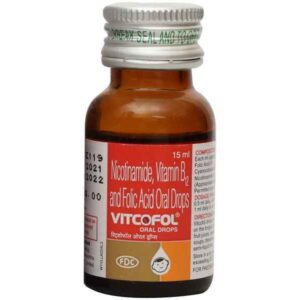FOLIC ACID + VIT B12 + NICOTINAMIDE
Folic Acid: Folic acid, also known as folate or vitamin B9, is a synthetic form of a water-soluble vitamin essential for various bodily functions. It is commonly prescribed as a dietary supplement to treat or prevent folate deficiency.
Folic acid works by converting into its active form, methyltetrahydrofolate, in the body. It plays a crucial role in DNA synthesis, red blood cell formation, and cell division. It is particularly important during periods of rapid growth and development, such as pregnancy and infancy.
The recommended daily dose of folic acid varies depending on the individual’s age, sex, and specific health condition. For adults, the usual dose ranges between 400-800 micrograms per day. Pregnant women often require higher doses, around 600-800 micrograms per day, to reduce the risk of neural tube defects in the developing fetus.
Folic acid is commonly used to prevent or treat folate deficiency anemia. It is also prescribed to pregnant women to support the healthy development of the fetus and prevent neural tube defects. Additionally, folic acid may be recommended for individuals with certain medical conditions, such as celiac disease, alcoholism, or inflammatory bowel disease, that can lead to malabsorption of folate.
While generally considered safe, folic acid may cause some side effects. These can include nausea, stomach upset, bloating, and flatulence. In rare cases, allergic reactions such as rash, itching, or swelling may occur. Extremely high doses of folic acid can mask symptoms of vitamin B12 deficiency, potentially leading to neurological complications if left untreated.
It’s important to note that folic acid supplements should not be used as a replacement for a balanced diet. Adequate dietary intake of folate-rich foods, such as leafy greens, citrus fruits, beans, and fortified grains, is essential for overall health. Individuals with specific health concerns or deficiencies should consult with a healthcare professional to determine the appropriate dosage and duration of folic acid supplementation.
Vit B12: Drug Name: Vitamin B12 (Cyanocobalamin)
Use: Vitamin B12, also known as cyanocobalamin, is a water-soluble vitamin that plays a vital role in the functioning of the brain, nervous system, and the formation of red blood cells. It is primarily used to treat and prevent vitamin B12 deficiency, which can lead to conditions like pernicious anemia, neuropathy, and cognitive impairment.
Mechanism of Action: Cyanocobalamin is converted into its active forms, methylcobalamin and adenosylcobalamin, in the body. These active forms are essential for various enzymatic reactions, particularly in the synthesis of DNA and the formation of myelin, which protects nerve cells. Vitamin B12 also supports the conversion of homocysteine to methionine, thereby reducing blood levels of homocysteine, which is linked to an increased risk of cardiovascular disease.
Dose: The dose of vitamin B12 varies depending on the severity of deficiency and the individual’s age and health condition. The usual recommended dosage for treating vitamin B12 deficiency is 1,000 to 2,000 micrograms (mcg) administered intramuscularly or subcutaneously, once daily or weekly for a few weeks. Maintenance doses of 100 to 1,000 mcg per month may be required for long-term B12 deficiency management.
Side Effects: Vitamin B12 is generally safe and well-tolerated when used as recommended. However, some individuals may experience mild side effects such as nausea, headache, diarrhea, or injection site reactions (pain, redness, itching). Rarely, allergic reactions can occur. High doses of vitamin B12 are usually safe but may cause side effects such as itching, rash, or anaphylaxis in individuals with cobalt allergies.
It is important to note that individuals with certain medical conditions, such as Leber’s disease (a hereditary eye disorder) or polycythemia vera (a blood disorder), should use vitamin B12 with caution and under medical supervision. Additionally, individuals taking certain medications, such as chloramphenicol or metformin, may require additional monitoring or adjustment of their vitamin B12 dose. It is always advisable to consult a healthcare professional before starting any new medication.
Nicotinamide: Nicotinamide, also known as niacinamide, is a form of vitamin B3 that is used as a medication. It is available in oral and topical forms. Nicotinamide is primarily used to treat or prevent niacin deficiency and its associated conditions, such as pellagra. It is also used as an adjunctive treatment for certain skin conditions, including acne and rosacea.
The exact mechanism of action of nicotinamide is not fully understood, but it is known to have various effects on cellular metabolism and function. It functions as a precursor to the coenzymes nicotinamide adenine dinucleotide (NAD) and nicotinamide adenine dinucleotide phosphate (NADP), which play crucial roles in energy production and metabolic processes. Nicotinamide also has anti-inflammatory properties and can modulate immune responses.
The standard dose of nicotinamide varies depending on the condition being treated. For niacin deficiency and pellagra, the typical dose is 300-500 mg orally three times a day. For acne and rosacea, lower doses of 250-500 mg orally twice a day may be used.
Nicotinamide is generally well-tolerated with few side effects. Common side effects may include gastrointestinal symptoms such as nausea, vomiting, and diarrhea. These side effects are usually mild and transient. In rare cases, allergic reactions may occur, and if any severe or persistent side effects are experienced, medical attention should be sought.
Overall, nicotinamide is a safe and effective medication when used as directed. However, it is important to consult with a healthcare professional before starting any new medication to ensure it is appropriate for your specific condition and medical history.

